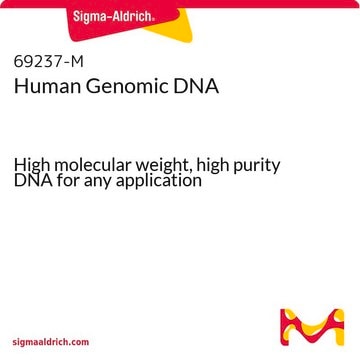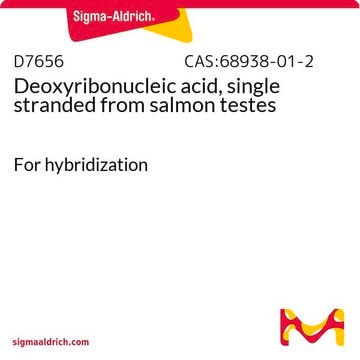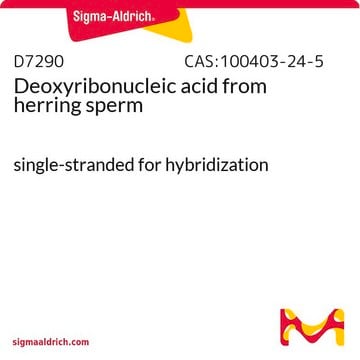D3035
Deoxyribonucleic acid from human placenta
buffered aqueous solution, sexed, female
Synonym(s):
DNA
About This Item
Recommended Products
biological source
human placenta
Quality Level
grade
for molecular biology
form
buffered aqueous solution
shipped in
dry ice
storage temp.
−20°C
InChI
1S/C15H31N3O13P2/c16-13-1-7(20)11(28-13)5-25-32(21,22)31-9-3-15(18)29-12(9)6-26-33(23,24)30-8-2-14(17)27-10(8)4-19/h7-15,19-20H,1-6,16-18H2,(H,21,22)(H,23,24)
InChI key
AWBASQCACWFTGD-UHFFFAOYSA-N
Looking for similar products? Visit Product Comparison Guide
General description
Application
- to compare the efficiency of DNA quantification methods
- as a standard in real-time PCR analysis of DNA samples from bladder cancer cell lines
- as an internal control to estimate the degree of fragmentation of circulating DNA
- for restriction digest analysis to identify low copy repeat regions of human chromosome 22q11
- to compare the 70-bp P5 exon sequence between DNA of different human and primate species
- to calculate copy number of genes, relative to normal human tissue
- in PCR reactions
Recommended products
related product
Storage Class Code
11 - Combustible Solids
WGK
WGK 3
Flash Point(F)
Not applicable
Flash Point(C)
Not applicable
Personal Protective Equipment
Certificates of Analysis (COA)
Search for Certificates of Analysis (COA) by entering the products Lot/Batch Number. Lot and Batch Numbers can be found on a product’s label following the words ‘Lot’ or ‘Batch’.
Already Own This Product?
Find documentation for the products that you have recently purchased in the Document Library.
Our team of scientists has experience in all areas of research including Life Science, Material Science, Chemical Synthesis, Chromatography, Analytical and many others.
Contact Technical Service








